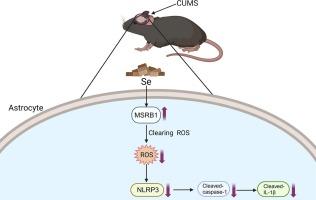Dietary selenium supplementation reduces susceptibility to depression-like behaviors in mice by increasing MSRB1 expression in hippocampal astrocytes
IF 3.8
2区 农林科学
Q2 FOOD SCIENCE & TECHNOLOGY
引用次数: 0
Abstract
The global burden of major depressive disorder (MDD) is increasing. Preclinical and clinical studies have indicated a close association between levels of trace elements and the incidence of MDD. However, little is known about the association between selenium levels and MDD. Methionine sulfoxide reductase B1 (MSRB1) is a selenoprotein regulated by dietary selenium levels that can indirectly clear reactive oxygen species (ROS). Here we show that supplementing the diet with L-selenomethionine, the most common organic selenium compound in organisms, effectively reduces the susceptibility of mice to depressive-like behavior induced by unpredictable chronic mild stress (CUMS). Furthermore, by knocking down MSRB1 in primary astrocytes and mouse hippocampi, we demonstrate that L-selenomethionine exerts its protective effect by increasing MSRB1 levels in hippocampal astrocytes. MSRB1 reduces ROS-induced neuroinflammation in astrocytes by indirectly clearing ROS. Our findings not only reveal a role for dietary selenium in regulating the susceptibility of mice to CUMS-induced depressive-like behaviors but also further identify the specific selenoprotein mediating this effect. These findings provide a potential dietary approach for preventing MDD in clinical practice and the motivation for further preclinical studies.

通过增加海马星形胶质细胞中 MSRB1 的表达,膳食补硒可降低小鼠抑郁样行为的易感性
重度抑郁症(MDD)给全球造成的负担日益加重。临床前和临床研究表明,微量元素水平与重度抑郁症的发病率密切相关。然而,人们对硒水平与重度抑郁症之间的关系知之甚少。蛋氨酸亚砜还原酶 B1(MSRB1)是一种受膳食硒水平调节的硒蛋白,可间接清除活性氧(ROS)。我们在这里发现,在膳食中补充生物体内最常见的有机硒化合物--L-硒代蛋氨酸,可有效降低小鼠对不可预测的慢性轻度应激(CUMS)诱发的抑郁样行为的易感性。此外,通过敲除原代星形胶质细胞和小鼠海马中的 MSRB1,我们证明了左旋硒代蛋氨酸是通过提高海马星形胶质细胞中 MSRB1 的水平来发挥其保护作用的。MSRB1 通过间接清除 ROS,减少了 ROS 诱导的星形胶质细胞神经炎症。我们的研究结果不仅揭示了膳食硒在调节小鼠对 CUMS 诱导的抑郁样行为的易感性中的作用,还进一步确定了介导这种效应的特定硒蛋白。这些发现为在临床实践中预防 MDD 提供了一种潜在的膳食方法,也为进一步的临床前研究提供了动力。
本文章由计算机程序翻译,如有差异,请以英文原文为准。
求助全文
约1分钟内获得全文
求助全文
来源期刊

Journal of Functional Foods
FOOD SCIENCE & TECHNOLOGY-
CiteScore
9.60
自引率
1.80%
发文量
428
审稿时长
76 days
期刊介绍:
Journal of Functional Foods continues with the same aims and scope, editorial team, submission system and rigorous peer review. We give authors the possibility to publish their top-quality papers in a well-established leading journal in the food and nutrition fields. The Journal will keep its rigorous criteria to screen high impact research addressing relevant scientific topics and performed by sound methodologies.
The Journal of Functional Foods aims to bring together the results of fundamental and applied research into healthy foods and biologically active food ingredients.
The Journal is centered in the specific area at the boundaries among food technology, nutrition and health welcoming papers having a good interdisciplinary approach. The Journal will cover the fields of plant bioactives; dietary fibre, probiotics; functional lipids; bioactive peptides; vitamins, minerals and botanicals and other dietary supplements. Nutritional and technological aspects related to the development of functional foods and beverages are of core interest to the journal. Experimental works dealing with food digestion, bioavailability of food bioactives and on the mechanisms by which foods and their components are able to modulate physiological parameters connected with disease prevention are of particular interest as well as those dealing with personalized nutrition and nutritional needs in pathological subjects.
文献相关原料
公司名称
产品信息
阿拉丁
L-selenomethionine
 求助内容:
求助内容: 应助结果提醒方式:
应助结果提醒方式:


